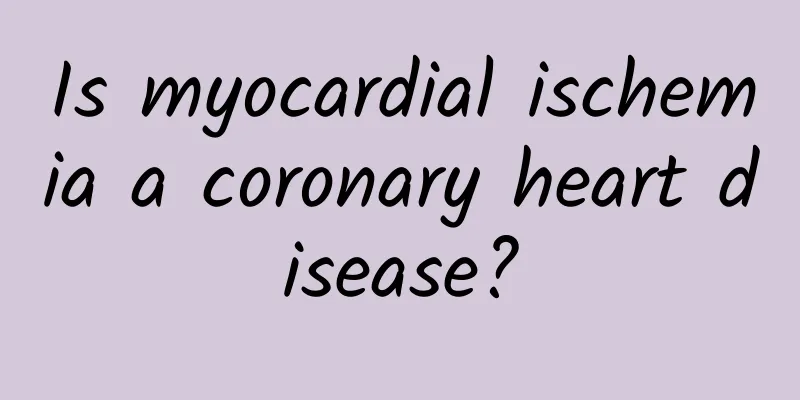Is myocardial ischemia a coronary heart disease?

|
Many patients with myocardial ischemia tend to think that they have coronary heart disease. So is myocardial ischemia actually coronary heart disease? To understand whether myocardial ischemia is coronary heart disease, we need to start with the concept of myocardial ischemia and its clinical manifestations and make a detailed analysis of myocardial ischemia. Only in this way can we know whether myocardial ischemia is related to coronary heart disease. We call coronary heart disease ischemic heart disease. From the concept, it seems to be related to myocardial ischemia, but not all myocardial ischemia is coronary heart disease. Coronary heart disease is only one of the factors that cause myocardial ischemia. Myocardial ischemia is also a heart disease. For many people, it is always difficult to distinguish between myocardial ischemia and coronary heart disease. There are often doubts about whether myocardial ischemia is coronary heart disease. What is the relationship between the two? Let's take a look at the introduction below! Is myocardial ischemia coronary heart disease? Myocardial ischemia refers to a pathological condition in which the heart's blood perfusion is reduced, resulting in reduced oxygen supply to the heart, abnormal myocardial energy metabolism, and inability to support the normal functioning of the heart. The blood supply to the heart is not constant, but fluctuates all the time. However, this fluctuation is regulated by the body itself, which keeps the supply and demand of blood relatively constant and ensures the normal functioning of the heart. If myocardial ischemia is caused by any reason and the body's regulation cannot meet the heart's working needs, this constitutes true myocardial ischemia. Low blood pressure, reduced blood supply to the aorta, and obstruction of the coronary arteries can directly lead to reduced blood supply to the heart; valvular heart disease, changes in blood viscosity, and myocardial lesions can also reduce blood supply to the heart. There is another situation where the heart's blood supply does not decrease, but the heart's oxygen demand increases, which is a relative myocardial ischemia. The blood vessels that supply blood to the heart are called coronary arteries, and their openings are in the ascending aorta. Is myocardial ischemia caused by coronary heart disease? Clinically, the main and most common cause of myocardial ischemia is coronary artery stenosis. The main cause of coronary artery stenosis is atherosclerosis. Heart disease caused by coronary atherosclerosis is commonly known as coronary heart disease. Therefore, coronary heart disease is the "culprit" of myocardial ischemia. Is myocardial ischemia coronary heart disease? The full name of coronary heart disease is coronary artery sclerosis, also known as ischemic heart disease. As the name suggests, there is an atherosclerotic plaque on the wall of the coronary artery that nourishes the heart. The plaque narrows the lumen and causes myocardial ischemia, which manifests as angina pectoris, arrhythmia, acute myocardial infarction, and cardiac arrest (or sudden cardiac death). However, coronary heart disease is the main cause of myocardial ischemia, but not the only cause. Other diseases can also cause myocardial ischemia. Is myocardial ischemia coronary heart disease? What are the methods for diagnosing coronary heart disease? When you experience chest tightness, precordial discomfort, and the electrocardiogram indicates myocardial ischemia, you can do a self-examination using two simple methods. ① When you experience chest tightness while resting, you can do activities that increase oxygen consumption, such as walking or washing clothes, to see whether the symptoms are alleviated or aggravated. If the symptoms are significantly alleviated or disappear after activity, they are often caused by mental factors. ② Take nitroglycerin sublingually immediately. If the symptoms are not relieved immediately within 3 to 5 minutes, it indicates that the chest tightness symptoms have little to do with angina pectoris caused by coronary heart disease. However, coronary heart disease is divided into two categories: with typical symptoms and without typical symptoms. Patients without typical symptoms who only feel stomach discomfort, nausea, or toothache, cervical pain, etc., are very likely to be missed or misdiagnosed, and may even die suddenly from the onset of acute myocardial infarction. Therefore, when you suspect you have coronary heart disease, you should go to the hospital and undergo necessary examinations. In the above, we analyzed whether myocardial ischemia is coronary heart disease. In the face of this problem, we have an in-depth understanding of what coronary heart disease is and what myocardial ischemia is. After studying the concepts and clinical manifestations of the two respectively, we found the answer to this question, that is, coronary heart disease is the main factor of myocardial ischemia but not the only factor. |
<<: Causes of Myocardial Infarction
>>: Difference between angina pectoris and myocardial infarction
Recommend
Prominence of thyroid cartilage
Protrusion of thyroid cartilage mainly occurs in ...
How to maintain health during the “first dog days”? Is Sanfutie reliable?
According to the traditional Chinese calendar, th...
Is it okay to boil Chinese medicine all at once?
Traditional Chinese medicine is one of the ways p...
When should the umbilical cord be cut if it is too short?
The lingual umbilical cord, also known as the lin...
What is Candida vulvovaginitis
For women who have started sexual life, the most ...
What to do if you feel dizzy or have heart discomfort
Some people find that they often experience dizzi...
Smoking and coughing up black phlegm is a good thing
Smoking has a great impact on health, and the lun...
The efficacy and function of Lespedeza
Lespedeza, also known as Lespedeza chinensis, is ...
What are the treatments for ankle bone hyperplasia?
Many people suffer from illness in their lives. D...
What is the medicinal value of buckwheat?
Buckwheat is an item that everyone is familiar wi...
Why do teeth have holes and smell bad?
Holes in teeth are caused by dirty teeth. When we...
Why do I have a lot of dry mucus?
Some people always have a runny nose, but over ti...
Does blue light therapy work for acne?
Acne is a troublesome disease on people's fac...
What is penis pain?
The penis is a relatively obvious reproductive or...
What are the dietary guidelines for patients with hypothyroidism?
People cannot avoid dealing with some diseases in...









